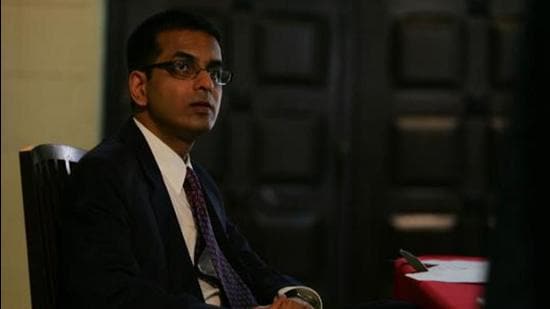Anti-terror law should not be used to quell dissent: SC judge DY Chandrachud
Justice Chandrachud was speaking at Indo-US Joint Summer Conference on Indo-US legal ties on Monday evening when he underscored that no law can be employed to harass citizens and take away their freedom
Supreme Court judge Dhananjaya Y Chandrachud has emphasised that criminal laws, including anti-terror legislation, should not be used for muzzling dissent and that courts must act as the “first line of defence” against deprivation of liberty.

Justice Chandrachud was speaking at Indo-US Joint Summer Conference on Indo-US legal ties on Monday evening when he underscored that no law can be employed to harass citizens and take away their freedom.
“Criminal law, including anti-terror legislation, should not be misused for quelling dissent or harassment to citizens. As I noted in my judgement in Arnab Goswami Vs the State, our courts must ensure that they continue to remain the first line of defence against the deprivation of liberty of citizens,” said the judge.
Justice Chandrachud added that depravation of liberty for even a single day is “one too many” and that judges must always be mindful of the deeper systemic issues of their decisions.
“Today, the world’s oldest and largest democracy represent these ideals of a multicultural, pluralist society where their constitutions are focused on a deep commitment and respect for human rights,” said the judge.
Justice Chandrachud’s remarks have come amid outrage over the death of 84-year-old activist Stan Swamy, who arrested under the anti-terror law in the Elgar Parishad case last year. He died last week in Mumbai while his bail plea on health grounds remained pending before the high court there.
Also Read | UAPA’s inherently flawed architecture and the role of courts
Several other cases where the Unlawful Activities (Prevention) Act (UPA) has been invoked have also courted controversies recently. Only a few days ago, Assam leader Akhil Gogoi walked out of jail after spending 17 months behind bars in connection to a case under UAPA against him over violent protests against the contentious citizenship law.
Last month, while granting bail to student activists Natasha Narwal, Devangana Kalita and Asif Iqbal Tanha, the Delhi high court made some sharp observations on the indiscriminate invocation of UAPA by the government and police. It said that foisting extremely grave and serious penal provisions engrafted in UAPA frivolously upon people would undermine the intent and purpose of the Parliament in enacting a law that is meant to address threats to the very existence of our nation.
Sharing his views at the online conference hosted by the American Bar Association (ABA) and Society of Indian Law Firms (SILF), justice Chandrachud also highlighted that the Supreme Court of India, which is the last court of appeal in the country, has a wide reach over its population, executive and lower courts.
The Supreme Court of India, he said, provides greater access to individuals by exercising not just its appellate jurisdiction but also its rich jurisdiction by protecting its fundamental rights enshrined in its constitution.
About the role of the Supreme Court in ensuring jails are decongested, justice Chandrachud pointed out that during the first wave of the pandemic in March 2020, the top court ordered all states to set up high-level committees to consider releasing convicts on bail or parole, who had been jailed for up to seven years.
“When the first wave subsided, those released were re-imprisoned. In view of the second wave in May 2021, the Supreme Court on May 7, ordered that those who were released in the first wave of the pandemic were eligible for immediate release and passed orders regarding improvement in prison sanitary conditions and regular Covid testing of inmates and prison staff,” said the judge, adding it is important that prisons are decongested because they are highly susceptible to becoming Covid hotspots.
Justice Chandrachud also said that the Supreme Court of India has often relied on comparative jurisprudence emanating from the US, indulging often in a transnational judicial dialogue.
“For instance in my judgement in Navtej Johar Vs Union of India, where the Indian Supreme Court decriminalised same-sex relations between adults, I relied on comparative law developments from the United Kingdom, the European Court of Human Rights and the celebrated decision in Lawrence Vs Texas of the US Supreme Court to hold that there was the growing liberal consensus towards the equal treatment of LGBTQ rights and that India could not be left behind in this transformational revision,” noted the judge in his address.
Dr Lalit Bhasin, president, SILF and Joseph L Raia, chair, ABA International, thanked justice Chandrachud for addressing the conference as its chief guest.
In his November 2020 judgment granting bail to Republic TV editor-in-chief Arnab Goswami and two others in a 2018 abetment to suicide case, justice Chandrachud had said: “It is the duty of courts across the spectrum — the district judiciary, the high courts and the Supreme Court — to ensure that the criminal law does not become a weapon for the selective harassment of citizens.”
In the Navtej Johar case, a five-judge bench had partially struck down Section 377 of the Indian Penal Code, decriminalising same-sex relations between consenting adults. In his opinion, justice had examined how, when Section 377 interacts with the existing social and moral proscriptions, its effect is to confine the LGBT+ community to the proverbial closet, causing great harm to their individuality, personhood, and dignity. The legal provision, thus, was held to be discriminatory and was read down to decriminalise consensual sex between consenting adults.





